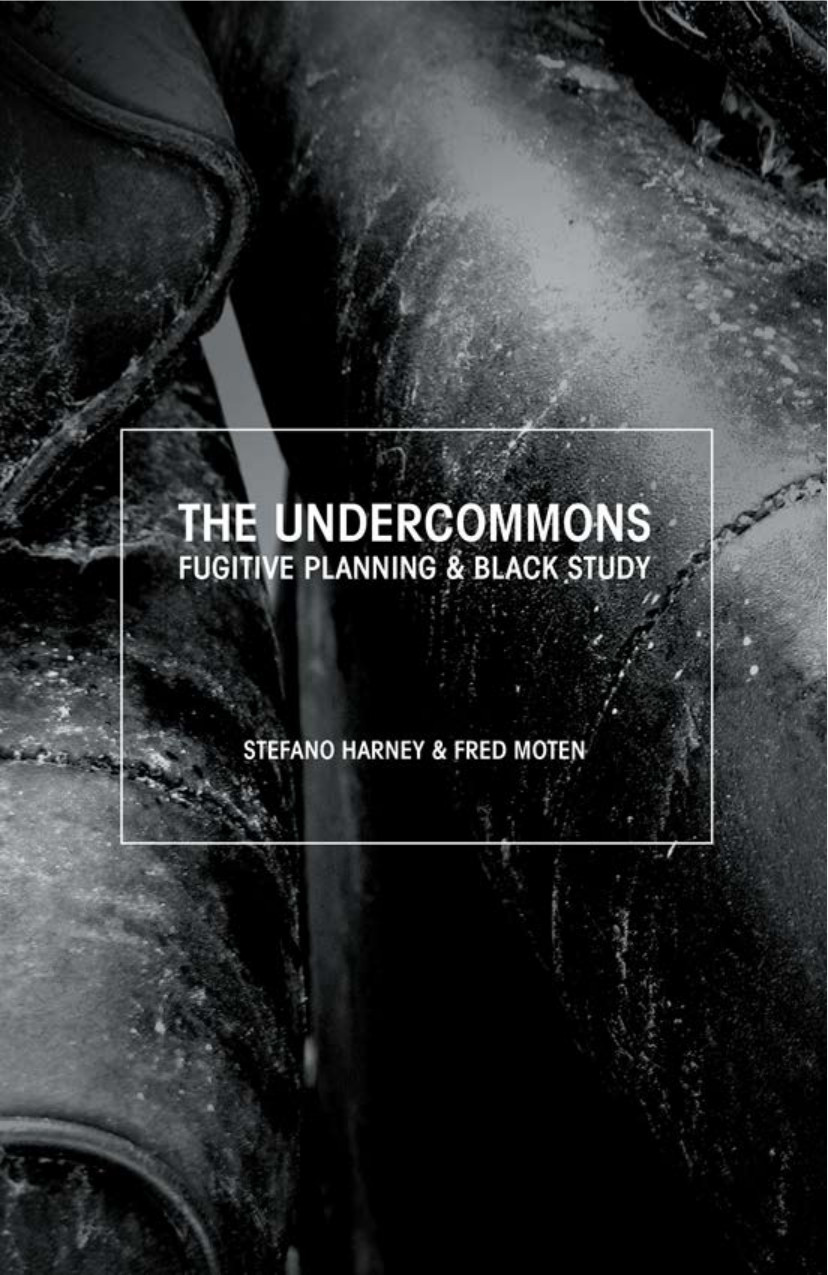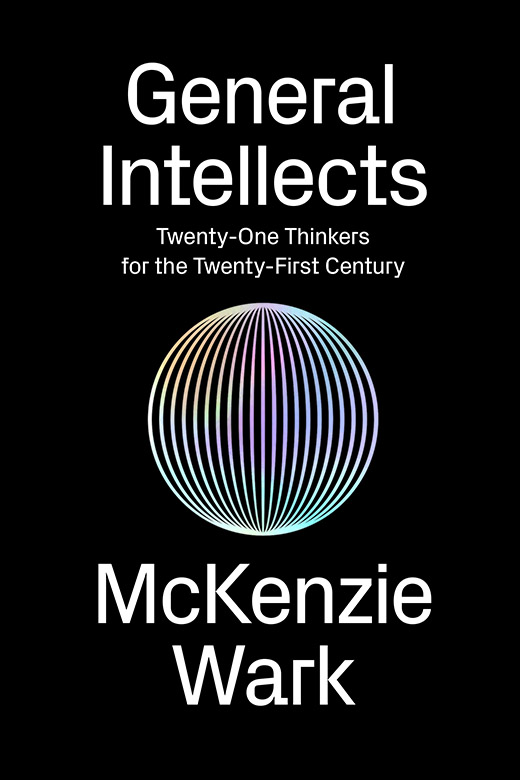Stefano Harney, Fred Moten: The Undercommons: Fugitive Planning & Black Study (2013–) [EN, DE, ES, FR]
Filed under book | Tags: · black people, blackness, commons, debt, politics, theory

“In this series of essays Fred Moten and Stefano Harney draw on the theory and practice of the black radical tradition as it supports, inspires, and extends contemporary social and political thought and aesthetic critique. Today the general wealth of social life finds itself confronted by mutations in the mechanisms of control: the proliferation of capitalist logistics, governance by credit, and the management of pedagogy. Working from and within the social poesis of life in the undercommons Moten and Harney develop and expand an array of concepts: study, debt, surround, planning, and the shipped. On the fugitive path of an historical and global blackness, the essays in this volume unsettle and invite the reader to the self-organised ensembles of social life that are launched every day and every night amid the general antagonism of the undercommons.”
Introduction by Jack Halberstam
Publisher Minor Compositions, Wivenhoe, 2013
Open access
ISBN 9781570272677, 1570272670
165 pages
Reviews: onderwijs filosofie (2015, NL), Kris Cohen (open set, 2016), Lisa M. Corrigan (Philosophy & Rhetoric, 2019).
Commentary: David Wallace (New Yorker, 2018).
Interviews with authors: Transversal (2016, EN/DE), Cristina Rivera Garza, Marta Malo, and Juan Pablo Anaya (New Inquiry, 2018), Millenials Are Killing Capitalism (2020, podcast, part 2).
Publisher (EN)
Publisher (DE)
Publisher (ES)
WorldCat (EN)
The Undercommons (English, 2013, PDF)
Die Undercommons (German, trans. Birgit Mennel und Gerald Raunig, 2016, EPUB)
Los Abajocomunes: planear fugitivo y estudio negro (Spanish, trans. Cristina Rivera Garza, Marta Malo and Juan Pablo Anaya, Cooperativa Cráter Invertido and La Campechana Mental, 2017, EPUB) (added on 2019-6-5)
Les sous-communs (French, 2022, added on 2022-1-11)
McKenzie Wark: General Intellects: Twenty-One Thinkers for the Twenty First Century (2017)
Filed under book | Tags: · anthropocene, capitalism, communism, culture, labour, marxism, neoliberalism, philosophy, politics, technology, theory, work

“A guide to the thinkers and ideas that will shape the future
What happened to the public intellectuals that used to challenge and inform us? Who is the Sartre or De Beauvoir of the internet age? General Intellects argues we no longer have such singular figures, but there are, instead, general intellects whose writing could, if read collectively, explain our times. Covering topics such as culture, politics, work, technology, and the Anthropocene, each chapter is a concise account of an individual thinker, providing useful context and connections to the work of the others. McKenzie Wark’s distinctive readings are appreciations, but are nonetheless critical of how neoliberal universities militate against cooperative intellectual work that endeavors to understand and also change the world.”
The thinkers included are Amy Wendling, Kojin Karatani, Paolo Virno, Yann Moulier Boutang, Maurizio Lazzarato, Franco “Bifo” Berardi, Angela McRobbie, Paul Gilroy, Slavoj Žižek, Jodi Dean, Chantal Mouffe, Wendy Brown, Judith Butler, Hiroki Azuma, Paul B. Préciado, Wendy Chun, Alexander Galloway, Timothy Morton, Quentin Meillassoux, Isabelle Stengers, and Donna Haraway.
Publisher Verso, London, 2017
Public Seminar series
ISBN 9781786631909, 1786631903
viii+325 pages
HTML
See also extra chapters on Eduardo Viveiros de Castro, Nick Land, Sianne Ngai, Wang Hui, Amitav Ghosh, Yves Citton and Bruno Latour.
Forensic Architecture (ed.): Forensis: The Architecture of Public Truth (2014)
Filed under book | Tags: · aesthetics, architecture, art, forensics, image, law, politics, theory, war

“Forensics originated from the term ‘forensis’ which is Latin for ‘pertaining to the forum.’ The Roman forum was a multidimensional space of negotiation and truth-finding in which humans as well as objects participated in politics, law, and the economy. With the advent of modernity, forensics shifted to refer exclusively to the courts of law and to the use of medicine, and today as a science in service to the law. The present use of forensics, along with its popular representations have become increasingly central to the modes by which states police and govern their subjects.
By returning to forensis this book seeks to unlock forensics’ original potential as a political practice and reorient it. Inverting the direction of the forensic gaze it designates a field of action in which individuals and organizations detect and confront state violations.
The condition of forensis is one in which new technologies for mediating the “testimony” of material objects—bones, ruins, toxic substances, landscapes, and the contemporary medias in which they are captured and represented—are mobilized in order to engage with struggles for justice, systemic violence, and environmental transformations across the frontiers of contemporary conflict.
This book presents the work of the architects, artists, filmmakers, lawyers, and theorists who participated directly in the “Forensic Architecture” project in the Centre for Research Architecture at Goldsmiths University of London, as well as the work of associates and guests. It includes forensic investigations undertaken by the project and its collaborators aimed at producing new kinds of evidence for use by international prosecutorial teams, political organizations, NGOs, and the UN. It also brings together research and essays that situate contemporary forensic practices within broader political, historical, and aesthetic discourse.”
With contributions by Lawrence Abu Hamdan, Nabil Ahmed, Maayan Amir, Hisham Ashkar & Emily Dische-Becker, Ryan Bishop, Jacob Burns, Howard Caygill, Gabriel Cuéllar, Eitan Diamond, DAAR (Decolonizing Architecture Art Residency), Anselm Franke, Grupa Spomenik, Ayesha Hameed, Charles Heller, Helene Kazan, Thomas Keenan, Steffen Krämer, Adrian Lahoud, Armin Linke, Jonathan Littell, Modelling Kivalina, Model Court, Working Group Four Faces of Omarska, Gerald Nestler, Godofredo Pereira, Nicola Perugini, Alessandro Petti, Lorenzo Pezzani, Cesare P. Romano, Susan Schuppli, Francesco Sebregondi, Michael Sfard, Shela Sheikh, SITU Research, Caroline Sturdy Colls, John Palmesino & Ann Sofi Ronnskog / Territorial Agency, Paulo Tavares, Füsun Türetken, Robert Jan van Pelt, Srdjan Jovanovic Weiss / NAO, Eyal Weizman, Ines Weizman, Chris Woods.
Publisher Sternberg Press, Berlin, and Forensic Architecture, London, 2014
ISBN 9783956790119, 3956790111
744 pages
Reviews: Léopold Lambert (The New Inquiry, 2014), Martin Howse (Mute, 2014), Gaston Gordillo (Society and Space, 2015), John Beck (Radical Philosophy, 2015).
Exh. review: Harry Burke and Lucy Chinen (Rhizome, 2014).
Exhibition
Publisher
Publisher
WorldCat
PDF (22 MB, updated on 2021-1-6)
Comment (0)
